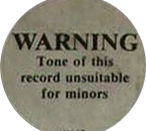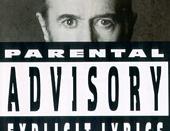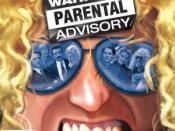I remember the first time I ever bought a CD on my own. I got a gift certificate to the mall for Christmas one year, and so into the CD store I went with visions of best sellers dancing in my head. After I made my selections, two of the more popular artists among young people, I danced merrily home, eager to listen to my new acquisitions. However, imagine my horror when upon seeing my choices, my parents promptly took the CD's away, appalled that I would listen to music containing such lyrics and profanity. My take on the situation? My parents were obviously freakishly overprotective zealots.
Everyone likes to blame the recent upsurge of school violence and shootings on things such as the violent and explicit content of mass media, including that of music. However, according to a study in the 1990's by the FTC, youth violence in America has actually been on a steady decrease.
Hillary Rosen, president and CEO of the Recording Industry Association of America stands behind that information. She asserts that the Parental Advisory Program is doing its job in controlling what some people might deem inappropriate for young, impressionable minds. According to a Kaiser Family Foundation report, 90% of parents feel that the RIAA is correct in not limiting explicit lyrics, but of filtering them with the parental advisory alert labels. It seems that perhaps the music itself is not the problem, nor is it a failure to alert parents that the CD's contain offensive lyrics. Perhaps in reality, the failure lies in the parents' inability to be aware of what their children are listening to.
Joel Flatow, the West Coast manager for RIAA emphasizes the need for parents to be aware of what their children listen to. In an article in the BBC...


